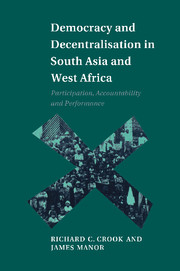Methodological appendix
Published online by Cambridge University Press: 12 October 2018
Summary
THE SURVEYS
In each of the four countries both a mass and an elite survey were undertaken using, as far as possible, a common questionnaire. In all, 2,030 respondents were interviewed. In Bangladesh a written Bangla (Bengali) translation of the questionnaire was used, and in India a written Kannada version. Both in Ghana and in Côte d'Ivoire the variety of local languages, some unwritten, was such that interviewers used either an English (Ghana) or French (Cote d'Ivoire) version as the basis for their work. In southern Ghana interviewers used mainly the Twi language; some who knew Krobo, Ga or Ewe were used for the very small number of respondents who felt more comfortable in those languages. At training sessions, interviewers practised simulations of the interviews in Twi and agreed on appropriate translations of particular phrases. In northern Ghana, the same procedure was adopted with the Mampruli language, although some interviewers in particular villages used the Bimoba or Konkomba languages.
In Côte d'Ivoire French is very widely spoken particularly in the south. Nevertheless, in the two southern communes, interviewers who could speak Attié or Dioula (the most widely spoken indigenous language in Côte d'Ivoire) were used and agreed translations discussed. In the north, three of the five interviewers were native Senoufo speakers and all knew Dioula.
In Ghana interviewers had to be recruited and trained locally in each district. In East Akim, twenty-four interviewers were used (twelve men and twelve women i.e. a pair for each village); about half were National Service personnel (university graduates or secondary school graduates waiting to go up to unversity), the others were teachers and a medical administrator with experience of census and health survey work. In East Mamprusi, the majority of the sixteen interviewers were local school teachers together with a few clerical staff from the District Education Office.
In Côte d'Ivoire, interviewers were recruited with the help of ORSTOM and ENSEA (the National School of Statistical Studies); a team of eight (four men and four women, mainly students) was used together with a ‘supervisor’ who works virtually full time on ORSTOM surveys.
- Type
- Chapter
- Information
- Democracy and Decentralisation in South Asia and West Africa , pp. 305 - 319Publisher: Cambridge University PressPrint publication year: 1998



